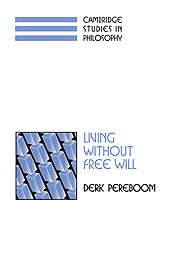Book contents
- Frontmatter
- Contents
- Acknowledgments
- Introduction: Hard incompatibilism
- 1 Alternative possibilities and causal histories
- 2 Coherence objections to libertarianism
- 3 Empirical objections to agent-causal libertarianism
- 4 Problems for compatibilism
- 5 The contours of hard incompatibilism
- 6 Hard incompatibilism and criminal behavior
- 7 Hard incompatibilism and meaning in life
- Bibliography
- Index
5 - The contours of hard incompatibilism
Published online by Cambridge University Press: 23 July 2009
- Frontmatter
- Contents
- Acknowledgments
- Introduction: Hard incompatibilism
- 1 Alternative possibilities and causal histories
- 2 Coherence objections to libertarianism
- 3 Empirical objections to agent-causal libertarianism
- 4 Problems for compatibilism
- 5 The contours of hard incompatibilism
- 6 Hard incompatibilism and criminal behavior
- 7 Hard incompatibilism and meaning in life
- Bibliography
- Index
Summary
HARD INCOMPATIBILISM DEFINED AND DEFENDED
My version of hard incompatibilism consists of two main theses. The first is that all of our actions and choices are either alien-deterministic events – events such that there are causal factors beyond our control by virtue of which they are causally determined, or truly random events – those that are not produced by anything at all, or partially random events – those for which factors beyond the agent's control contribute to their production but do not determine them, while there is nothing that supplements the contribution of these factors to produce the events. The second thesis is that incompatibilism defined by the Causal History Principle is true. Traditionally, incompatibilism is the view that freedom of the sort required for moral responsibility is incompatible with determinism. I have expanded the notion to mean that freedom of this sort is incompatible with our actions and choices being events that lie on the continuum from alien-deterministic through partially random to truly random events. Together, these two theses yield the conclusion that we do not have the kind of free will required for moral responsibility.
The justification for each of these claims is implicit in the case I've made against libertarianism and compatibilism. The argument for the first thesis – that all of our actions and choices are events that lie on the responsibility-undermining continuum – arises from the arguments developed in Chapter 3 (Empirical Objections to Agent-Causal Libertarianism).
- Type
- Chapter
- Information
- Living without Free Will , pp. 127 - 157Publisher: Cambridge University PressPrint publication year: 2001



